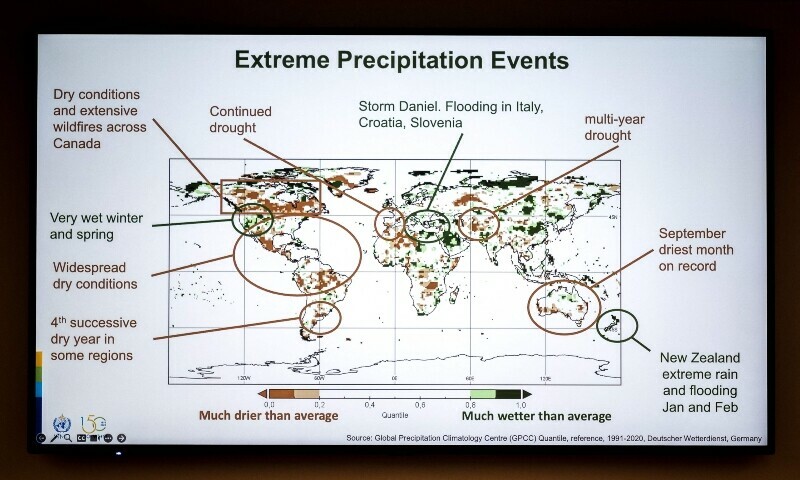Global temperatures “smashed” heat records last year, as heatwaves stalked oceans and glaciers suffered record ice loss, the United Nations said on Tuesday — warning 2024 was likely to be even hotter.
The annual State of the Climate report by the UN’s World Meteorological Organisation (WMO) confirmed preliminary data showing that 2023 was by far the hottest year ever recorded.
And last year was part of “the warmest 10-year period on record”, the WMO weather and climate agency said, with even hotter temperatures expected going forward.
“There is a high probability that 2024 will again break the record of 2023”, WMO climate monitoring chief Omar Baddour told reporters.
Reacting to the report, UN chief Antonio Guterres said it showed “a planet on the brink”.
“Earth’s issuing a distress call,” he said in a video address, pointing out that “fossil fuel pollution is sending climate chaos off the charts”, and warning that “changes are speeding up”.
The WMO said that last year the average near-surface temperature was 1.45 degrees Celsius above pre-industrial levels — dangerously close to the critical 1.5°C threshold that countries agreed to avoid passing in the 2015 Paris Climate Accords.
‘Red alert’
“Never have we been so close […] to the 1.5°C lower limit of the Paris Agreement,” WMO chief Celeste Saulo warned.
“I am now sounding the red alert about the state of the climate,” she told reporters, lamenting that “2023 set new records for every single climate indicator”.
The organisation found that many of the records were “smashed” and that the numbers “gave ominous new significance to the phrase ‘off the charts’”.
Saulo stressed that climate change was about much more than temperatures.
“What we witnessed in 2023, especially with the unprecedented ocean warmth, glacier retreat and Antarctic sea ice loss, is cause for particular concern,” she said.
One especially worrying finding was that marine heatwaves gripped nearly a third of the global ocean on an average day last year.
And by the end of 2023, more than 90 per cent of the ocean had experienced heatwave conditions at some point during the year, the WMO said.
More frequent and intense marine heatwaves will have “profound negative repercussions for marine ecosystems and coral reefs”, it warned.
At the same time, it warned that key glaciers worldwide suffered the largest loss of ice ever since records began in 1950, “driven by extreme melt in both western North America and Europe”.
In Switzerland, where the WMO is headquartered, Alpine glaciers had lost 10pc of their remaining volume in the past two years alone, it said.
The Antarctic sea ice extent was also “by far the lowest on record”, WMO said.
Rising sea levels
In fact, it pointed out, its maximum area at the end of the southern winter was around one million square kilometres below the previous record year — equivalent to the size of France and Germany combined.
Ocean warming and the rapidly melting glaciers and ice sheets also drove the sea level last year to its highest point since satellite records began in 1993, WMO said.
The agency stressed that the global mean sea level rise over the past decade (2014-2023) was more than double the rate in the first decade of satellite records.
It highlighted that dramatic climate shifts are taking a heavy toll worldwide, fuelling extreme weather events, flooding and drought, which trigger displacement and drive up biodiversity loss and food insecurity.
“The climate crisis is the defining challenge that humanity faces and is closely intertwined with the inequality crisis,” Saulo said.
‘Glimmer of hope’
The number of people who are considered acutely food insecure around the world has more than doubled, from 149 million people before the Covid-19 pandemic to 333m at the end of 2023, WMO pointed out.
The organisation did however highlight one “glimmer of hope”: surging renewable energy generation.
Last year, renewable energy generation capacity — mainly from solar, wind and hydropower — increased by nearly 50pc from 2022, it said.
Guterres also emphasised that there was still time to avert a prolonged crisis.
The world, he insisted, still has a chance to keep the planet’s long-term temperature rise below the 1.5°C threshold and “avoid the worst of climate chaos”.
“We know how to do it. “





